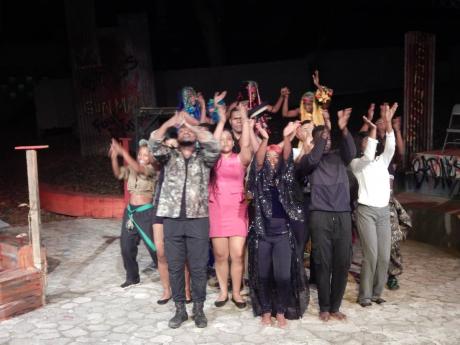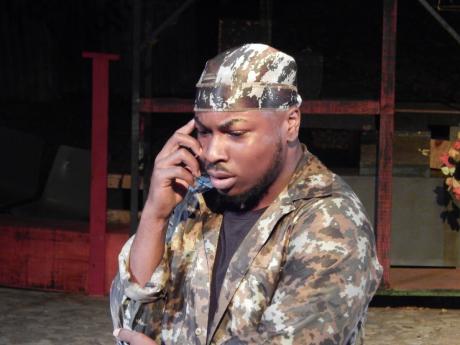‘Macbeth’ successfully reinterpreted as a Caribbean tragedy
It’s a tribute to both the universality of William Shakespeare’s Macbeth and the creativity of the directors that the current School of Drama production of the tragedy – though one the playwright couldn’t have imagined – is a complete success.
One reason for that success is that directors Camille Quamina and Marvin George manage to have it realistically, frighteningly, reflect “our inner cities, politics and gang violence”. The reinterpretation of the play’s strong supernatural element in a regional “duppy-zombie-jumbie” context helps a lot.
Owing to the political turmoil of the Elizabethan age, the play would have resonated in very specific ways with its original audiences, but the directors invite us to view it in more general terms. They cast it as “a tragedy about an ambitious usurper desperately trying to better his circumstance upon receiving a prophecy from three witches. Emboldened by his wife, he does so through violence, setting anarchy in motion and throwing the state into disarray”.
Substitute an obeah woman for three witches and there is probably no West Indian country in which we couldn’t find a few true-life stories fitting that description. And what music has the requisite echoes? Dancehall, of course, which we hear throughout the production.
As George writes in the directors’ notes: “There is a meeting [of geographical and historical themes] jumbie and duppy; mas and dancehall; ‘crab-in-barrel’ and slave-ship/slavery. The violence must be historicised.” In every society and time there will be ambitious husbands with pushy wives as well as instances of man’s inhumanity to man.
Since human nature insists on remaining human, stories about us will remain similar, so the real challenge to the directors was not in matching modern situations with Elizabethan ones. The real challenge that Jamaicans have with Shakespeare is his language, and I refer here particularly to Jamaican students, since this is a school production.
How do the directors overcome that? With spectacle, context and very good actors.
The show’s visual elements – the setting, the costumes and the lighting – are outstanding. It is placed outdoors, on the stone stage of the amphitheatre, with grass mounds around it, stone steps and a stone tower looming above. All are utilised very effectively, since much of the play takes place outdoors.
A minimalist set of cloth, wood and zinc is constructed for in-house (Macbeth’s castle) and in-yard scenes. Designed by Lauriston ‘Larry’ Watson, the set was constructed by Gavin Wright and Omar Scott.
Some of the colourful costumes suggest both Jamaica’s Jonkunoo (with the three witches looking very like the Pitchy Patchy character) and Trinidad’s carnival. (However, the programme notes state the inspiration came from elsewhere.) The witches are played by Jordann Waugh, Kimberly Ricketts and Alexa Larcher. The soldiers’ outfits are straight out of the army, while civilians wear modern clothes.
Costume design and props were by Stacy-Ann Banton. She needed to have several student assistants, and even so, in the fast-moving show, the work would’ve been considerable. The lighting designer, Calvin Mitchell, was helped by the soundscape and video projections created by the directors. The ghost of Banque needed special lighting.
The actors are shown in contemporary settings. Cell phones are used and Queen Duncan (Rosebigate Newton) has a press photographer following her when she comes to visit Macbeth (Trevon Robinson) and Lady Macbeth (Jasmine Collins) at their castle.
She never leaves. Her murder, the first of many by Macbeth, sets off the anarchy in the Scottish kingdom.
The decision to put the witches on stilts was an inspired one. They become, in reality, larger than life and because they appear in so many (extra) scenes, we can believe they influence the action of the entire play.
Perhaps because they have a story they can understand, the actors are able to put genuine feeling into their speech, and their speech coach has them enunciating and pronouncing remarkably well. The words that are lost don’t detract from the power of the production.
The other actors are: Javian Kiffin (Banquo); Jesse McClure (Malcolm); Alvin Wilson (Macduff); Abijah Warren (Ross); Shaniquah Savage (Lennox); Rhona McKenzie, who shines as both the porter and a servant; Kizzy Hope (Lady Macduff); and, as the murderers, Shakera Williams, Kyle Gooden and Kushnie Maxwell.
The play opened last weekend and continues on Friday, Saturday and Sunday at 7 p.m.


